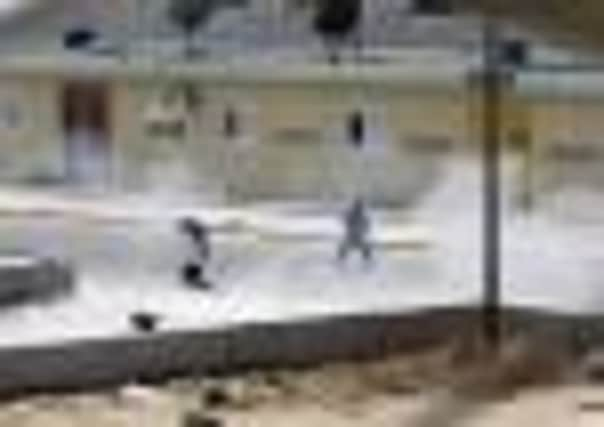British journalists freed after captivity ordeal in Tripoli hotel


Reporters feared for their lives as gunmen prevented them from leaving the five-star Rixos in the capital, Tripoli, as rebel fighters stormed Gaddafi’s lair and took control of large areas of the city.
Battles flared across the capital Tripoli yesterday, with pro-regime snipers cutting off the airport road while others launched attacks on the former private compound which rebels have adopted as a staging post.
Advertisement
Hide AdAdvertisement
Hide AdIn hiding, Gaddafi has vowed to fight on “until victory or martyrdom” and the Rixos soldiers were unaware of how far the rebels had advanced. They finally surrendered their weapons and left yesterday following the intervention of the International Committee of the Red Cross. One apparently broke down in tears shortly before the journalists were released.


The Rixos had been seen as a key location for the Gaddafi regime and was the scene of the surprise reappearance of the dictator’s son, Saif al-Islam, following reports he had been captured earlier this week.
The regime obliged foreign media to stay there while covering the conflict.
Trapped inside, and moving from room to room to avoid attacks on the hotel and gunfire from within, journalists had been posting online messages describing their ordeal and trying to reassure loved ones.
Advertisement
Hide AdAdvertisement
Hide AdIt was feared they would be the target of revenge attacks or used as human shields if Gaddafi forces decided to make the hotel the site of their last stand.
ITV News correspondent John Ray described how he and his colleagues had managed to escape. “We basically went out of a fire door at the back, ran across the open ground, hunkered down by a wall, slipped out having pushed the back gate open and thumbed down a lift at the side of the road.
“The man who stopped and picked us up – I have to praise him for his bravery and humanity – he took us 100 metres down the road but was telling us in Arabic it really wasn’t safe.
“To prove his point, by the side of the road there was a car that had obviously been fired upon and at the side of the car,
Advertisement
Hide AdAdvertisement
Hide Ad“I’m sorry to say, there was a body of a man who had been shot by, I assume, the army.
“Our driver turned around and took us to a neighbourhood very close to the Rixos Hotel. Those people took us in, they fed us, they gave us water. They represented the best of not just Libya but the best of humanity.”
Mr Ray said the crew had booked into the Rixos after being given “bum information” it had been liberated.
“We were effectively being guarded, held hostage if you like, by gunmen of the regime,” he added.
Advertisement
Hide AdAdvertisement
Hide Ad“We faced a difficult choice. Did we hang on hoping the rebels would storm the place with the minimum of fuss or did we need to get out of there in the fear that nobody would come to rescue us or indeed that the Libyan army would move in? They were supposedly camping out in the woods behind us.”
BBC correspondent Matthew Price said the group, which included a US congressman and Indian politician, had been held in an area measuring only 200 square feet and power cuts meant they were unable to watch on television as rebel fighters stormed Gaddafi’s heavily-fortified Bab al-Aziziya compound.
The impact of months of fighting on Libya’s children was becoming clearer last night as charity workers sought to help those left psychologically scarred by the war.
Jenny Humphreys, 35, who is working for Save the Children in Benghazi, said thousands of children had fled Misrata, Brega and Ajdabiya to the city.
Advertisement
Hide AdAdvertisement
Hide Ad“They have witnessed the destruction of their homes and neighbourhoods,” she said. “They have seen death and injury of their family or neighbours, terrible sights.”
It is still too dangerous for aid workers from the charity to get into Tripoli.